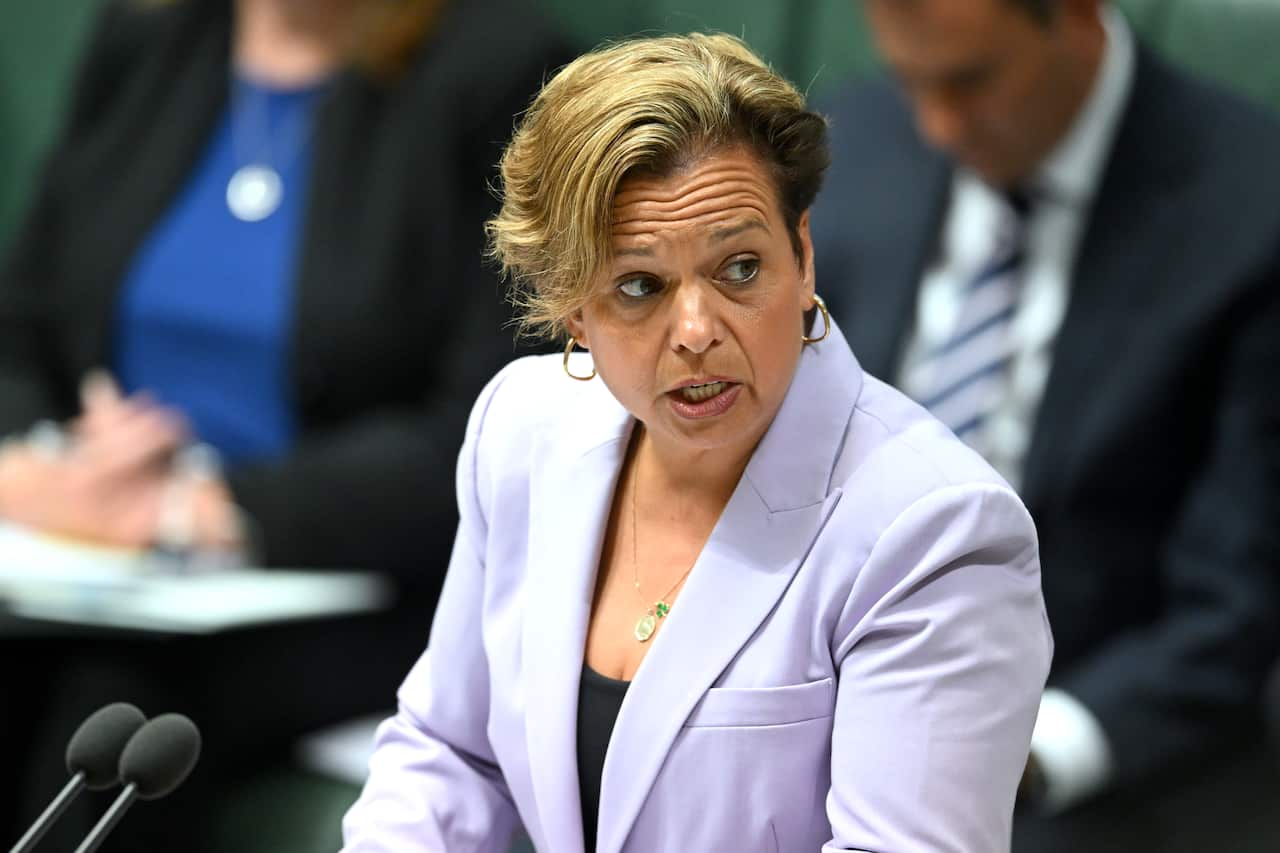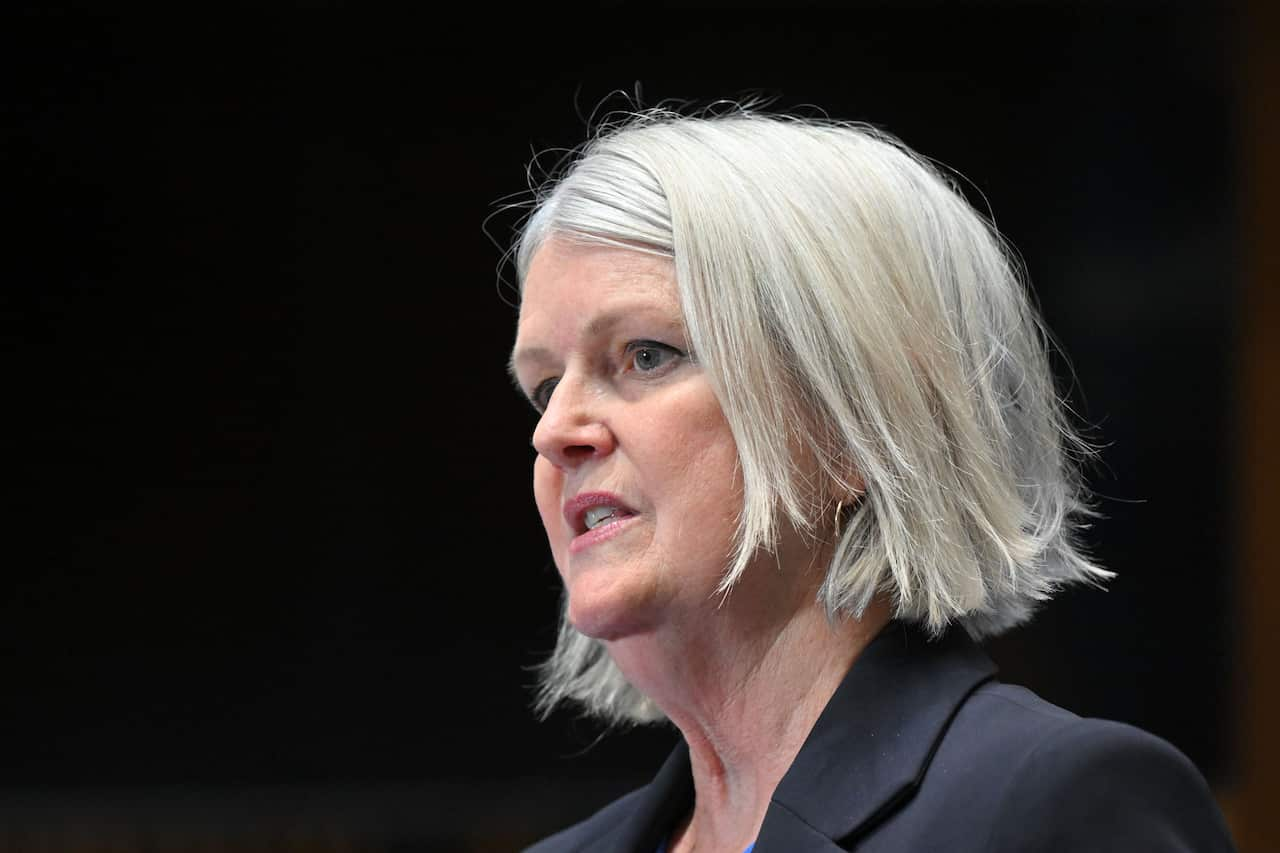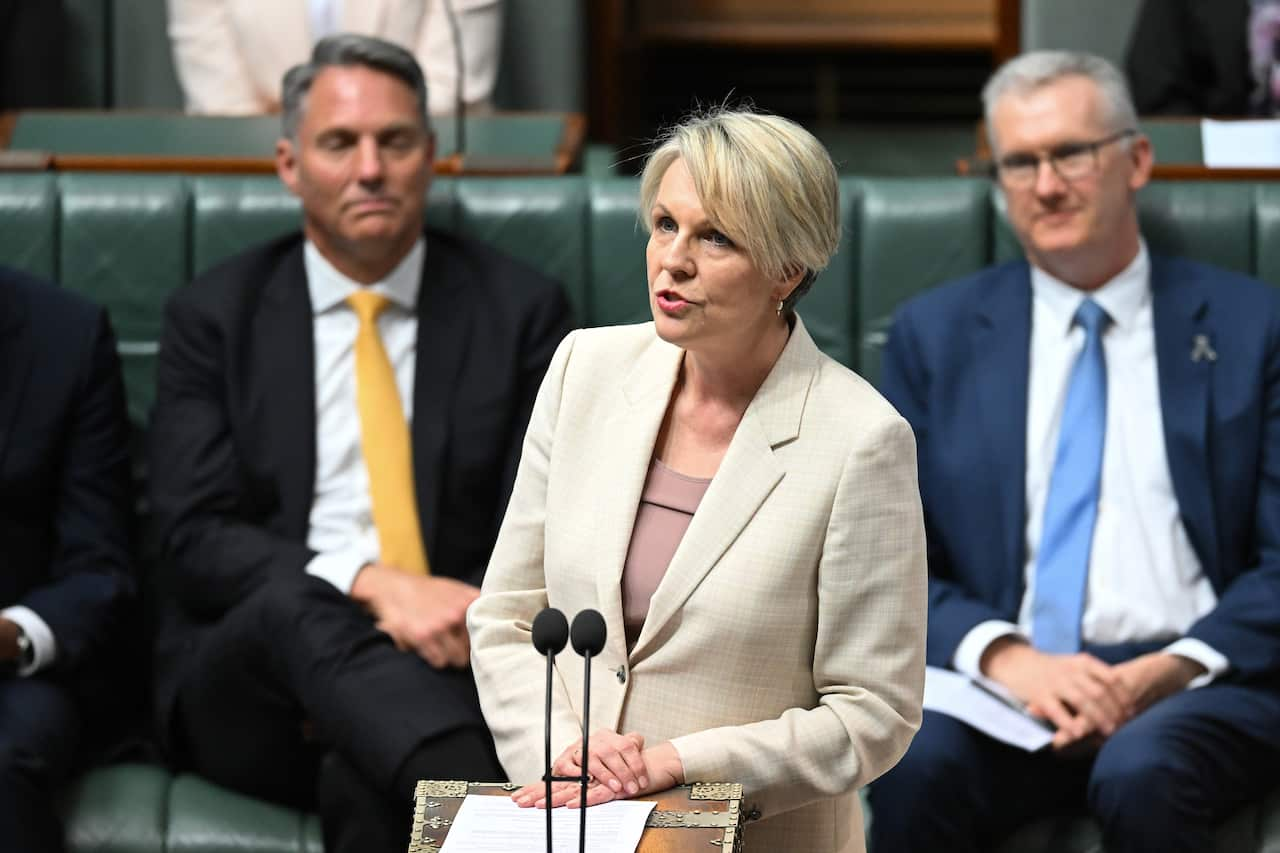"Are we good enough?"
This question has stayed with Felicity Button since the day she discovered $11,571 had been withdrawn from her bank account.
It was 2017, and Button had just taken her baby daughter to a doctor's appointment. She says she had recently been paid, and knew she could afford the appointment, medication and petrol to return home.
"I went to go and pay for my appointment, and my card declined," she says.
Button contacted Centrelink and found out that a debt collector had withdrawn the money, claiming she owed a historical robodebt.

Several years prior, Button had received income support from Centrelink — Youth Allowance and Austudy — while studying for her nursing degree and working several jobs. However, that support ended in 2015.
She recalls receiving a letter in September 2016, alleging she owed a debt, which she subsequently queried with Centrelink. She says the service "couldn't really give [her] any answers". After nearly a year of correspondence, she was moved onto a payment plan of $20 per week. Then the money was unexpectedly withdrawn from her account in September 2017.
While driving home, she recalls feeling powerless and saying: "I may as well run my car off the road."
Between 2015 and 2019, the debt recovery scheme set up by the then Coalition government relied on an automated assessment of tax office and welfare payment data to calculate average earnings and issue debt notices to welfare recipients. The process often failed to accurately reflect earnings, with many recipients pursued for debts they did not owe, including Button.
The scheme raised $1.76 billion from around 526,000 recipients through approximately 794,000 debt recovery transactions.
A royal commission into the scheme, which ran between 2022 and 2023, described robodebt as a "crude and cruel mechanism" that was "neither fair nor legal" and "made many people feel like criminals".
"In essence, people were traumatised on the off-chance they might owe money. It was a costly failure of public administration, in both human and economic terms," the commission wrote in its final report in 2023.
Victims suffered severe impacts from being falsely accused of owing debts, the report found. In some circumstances, the despair robodebt caused led to recipients taking their own lives.
Button, now a mother of two, appears in SBS' upcoming docu-drama series The People vs Robodebt. She has been one of the lead applicants in a years-long class action lawsuit brought against the federal government over the botched debt recovery scheme, including a landmark appeal settled last week. Her money was returned; however, the ordeal has had a lasting impact.
"I think mothers inherently always question ourselves on whether or not we're doing a good enough job … and are we good enough? That's unfortunately ingrained in being a woman and a mother, for the most part," Button says.
"But this brings it to a much deeper level … It makes you think, all it takes is one thing to completely derail your life."
She's one of many robodebt victims who have fought for compensation and are now seeking accountability.
'Financial vindication' or 'accountability avoided'?
Button first joined the legal fight against robodebt in 2019.
Launched by Gordon Legal, the initial class action was settled in 2020, with the federal government agreeing to repay wrongfully raised debts and accrued interest — amounting to a settlement of $1.8 billion. (The majority of this cleared the $1.76 billion in unlawful deductions).
Last week, it announced that an appeal led by the firm had been settled for a further $548.5 million, including $475 million in compensation for victims.
Gordon Legal says the appeal was launched following the release of the royal commission's report in 2023, which uncovered new evidence of misfeasance — the wrongful use of legal authority — by senior public servants who designed and ran the scheme.
The appeal argued that the new evidence should be considered to allow victims to seek further compensation.
"The allegations were that very senior public servants knew that the scheme they were implementing was unlawful," Gordon Legal partner Andrew Grech says.
"If we were able to establish that in court, as we believed we would be able to … that would have meant group members who suffered distress or further financial loss, or in some tragic cases, had loved ones who took their own lives, would have been able to seek financial damages compensation for the distress that they suffered," he says.
That was very significant because many group members felt the original class action didn't really answer some of those questions, and didn't make the public servants involved truly accountable for what had occurred.
Grech hopes victims feel a "sense of finality" and that their concerns "have been listened to".
Attorney-General Michelle Rowland said the settlement shows the Albanese government's "ongoing commitment to addressing the harms caused to hundreds of thousands of vulnerable Australians by the former Liberal government's disastrous robodebt scheme".
"Settling this claim is the just and fair thing to do," she said.
The agreement includes up to $60 million in administration costs and up to $13.5 million to cover the applicants' legal costs, with the remaining $475 million for compensation.
If approved by the Federal Court, the government said this would be the largest class action settlement in Australian history. According to Gordon Legal, it would deliver more than $2.4 billion in financial redress for victims.

For Button, the settlement brought some relief.
"[It] was really reflective of the financial penalty that the government has to now pay for such an egregious act, which is sad, because we're looking at it from a financial penalty point of view … but there's no compensation to the families that lost people," she says.
"You can give them all the money in the world; it's not going to bring the person back."
Australian Council of Social Service chief executive Cassandra Goldie welcomed the settlement but said it does not "deliver full justice" for victims.
"Ten years on from when robodebt commenced, no-one responsible for its design, implementation and continuation has been publicly held accountable in a way that delivers justice for its victims and their families," she said in a statement.

Christopher Rudge is a lecturer at Sydney Law School, researching welfare law. Beyond the settlement being "a day of financial vindication" for victims, he also believes it's "a day of accountability avoided for those who designed the scheme".
"This isn't just a payout; it's the price the government was willing to pay to avoid a public trial based on the royal commission's evidence of misfeasance in public office," he says.
The settlement ensures the central legal claim of the litigants will never be tested in court.
While the Commonwealth may have been able to successfully defend the claim, Rudge argues: "We still would have been able to better scrutinise the standards we expect of public servants in Australia."
Grech says that in any litigation process, "the answers are never complete".
"What we think we've been able to do is to shine a light on what was unlawful conduct and to ensure that people harmed by it get some sense of closure and some redress for the harm that was caused to them," he says.
What happens now?
It could take up to six months for the Federal Court to approve the settlement, Grech says. A minimum of $475 million would then be available to distribute among members who choose to participate; however, the specifics of how that will be allocated to individuals have yet to be determined.
With up to 471,000 members in total, Grech expects there to be tens of thousands of people who would opt to receive a fixed payment or individualised assessment. To put that in perspective: if 471,000 registered, the average compensation amount for each person would be $1,008.
Rudge says the settlement's billing as the largest of its kind in Australia is "a reflection of the size of the cohort rather than the generosity of the payments to victims".
Meanwhile, an investigation into six referrals from the royal commission is being led by the National Anti-Corruption Commission (NACC), based on an announcement made by an independent decision maker for the NACC in February. The referrals were contained in a sealed chapter, recommending individuals for civil action or criminal prosecution.
This reversed an earlier decision by the NACC not to commence a corruption investigation against the six individuals.
"If any of those six referred individuals committed a breach of public trust, then we should expect that private hearings will be held — or could have already been held — and we await any findings emanating from those hearings," Rudge says.
"The powers of the NACC are primarily referral-based. It doesn't have the power to prosecute, lay charges or convict in its own right."
While Button is relieved with the class action win, she wants to see individuals held to account.
"I just want to see criminal charges laid on the people that orchestrated, designed and constructed the scheme," she says.
"And I want to see further mental health support for people who lost more than money can recoup.
Another scheme: Addressing a historical debt calculation
Robodebt is not the only instance of unlawful debt calculations by government agencies.
On 27 August, the government announced it would be rolling out "resolution payments" for those potentially impacted by a historical debt calculation method known as income apportionment.
The practice was used by Centrelink between 1991 and 2020 to calculate debts for recipients where it was unclear when income was earned. It involved averaging income evenly across two or more fortnightly payment blocks.
The Commonwealth Ombudsman found the method was unlawful in 2023, but said this arose from agencies "genuinely holding an incorrect understanding" of the law.
The government estimates that around 5.5 million debts — previously or currently held by around three million people and worth around $4.4 billion — may be affected. The vast majority have already been repaid.
A bill introduced to parliament seeks to address income apportionment by validating its use for past calculations, and setting up a resolution scheme for those with potentially affected debts.

This follows the Federal Court's approval of a method for the government to recalculate debts owed in July.
"Nevertheless, the government instead said, rather than go back and recalculate all these unlawful debts, we will put forward legislation that validates those past unlawfully calculated debts, and we will pay a $600 resolution payment to anyone identified as affected," Rudge says.
Introducing the bill to parliament on 4 September, Social Services Minister Tanya Plibersek said reopening debts and recalculating them "would cause distress and protracted uncertainty for the people affected", and divert critical government resources away from frontline services.
"This was not robodebt," she stressed.
Rudge says the government has been clear in distinguishing income apportionment from robodebt. However, while they are distinct methods of calculating debts, he argues there is overlap.
"A single debt could be affected by both," he says.
Automatic cancellation of job seeker payments 'unlawful'
Meanwhile, the Commonwealth Ombudsman has been investigating the cancellation of job seeker payments by a government department under an automated system.
The Targeted Compliance Framework (TCF) was set up in 2018 to ensure job seekers complete specific activities, called mutual obligation requirements, in order to continue receiving payments. This process is managed by the Department of Employment and Workplace Relations (DEWR) and Services Australia.
New laws were introduced in April 2022 that required consideration of a job seeker's circumstances before deciding to cancel a payment.
However, the ombudsman found 964 people had their income support automatically cancelled between April 2022 and last July, when the DEWR secretary paused cancellations.
"A further 45 job seekers received automated cancellations after the secretary's decision to pause cancellations, when they should not have," ombudsman Iain Anderson said in a report, published on 6 August.
The ombudsman said agencies' cancellation of income support was not lawful and did not ensure processes and computer systems were complying with amended legislation.
He cited conclusions from the robodebt royal commission about the use of automated processes, and the "serious impact" these can have on vulnerable people.
The report recommended the department not resume cancellations until errors are rectified and cancellations are compliant with the law.
Separately, the government commissioned an independent assurance review into the IT system that underpins the framework. Undertaken by Deloitte and released on 14 August, it found a "critical lack of traceability" linking legislation, operational policy and "automatic compliance logic" embedded within the system.
In a statement to SBS News, a DEWR spokesperson confirmed it has accepted all recommendations from the ombudsman's report, noting it and Deloitte's review made "a number of important findings and recommendations, including areas for urgent action and longer-term improvements".
The department is taking immediate steps to address the urgent actions identified.
The spokesperson confirmed all payment reductions and cancellations remain paused.
The Australian Financial Review also reported that the Deloitte report includes a number of fabricated references, including to academic works. Rudge, who discovered the errors, suspects these were generated by artificial intelligence.
The DEWR spokesperson said Deloitte has confirmed some footnotes and references in its final report were incorrect.
"The department has requested that Deloitte provide a corrected version of the statement of assurance and final report as soon as possible," the spokesperson said.
SBS News understands Deloitte is managing the matter.
In Rudge's view, the TCF has a "broad policy commonality" with other scandals.
"It's a framework designed to ensure that welfare recipients are never permitted to receive an entitlement that is in any way suspected of being an overpayment," he says.
"When a policy initiative is pursued relentlessly, internal decision-making becomes siloed and overly goal-oriented, and decisions are made in an unexamined way that is contrary to law. That is what has happened here, just as in the other schemes, although in a very different way."
Could robodebt happen again?
Rudge points to a growing risk of technological error, particularly with the rise of AI interacting with complex legislation.
"I think all of the variables combine to become the ingredients of another scandal," he says.
"If we're not careful and if there isn't a paradigm shift … we could see it [robodebt] happening again."
Rudge argues a change in policy approach is needed, one that focuses on the entitlement of welfare recipients to support.
"The principle should be that rather than assume there is fraud in every area of the system, it should be the working assumption that people are entitled to the welfare that they are receiving, and there should be a much higher threshold for investigating fraud," he says.
Button hopes the robodebt settlement is a "wake-up call to the government to say 'we're not going to tolerate this'".
She says her fight was never about the money.
"More importantly, the future looks a bit brighter for my kids."
All three episodes of The People vs Robodebt will premiere on 24 September on SBS on Demand. Episodes will air weekly on SBS.
For the latest from SBS News, download our app and subscribe to our newsletter.

